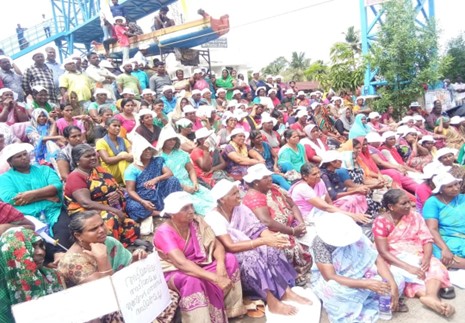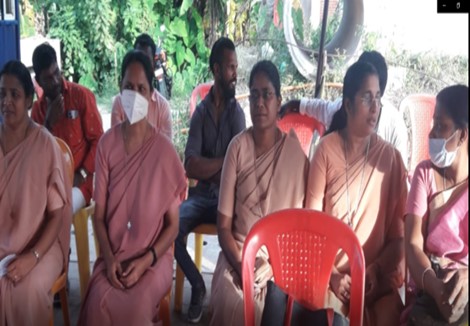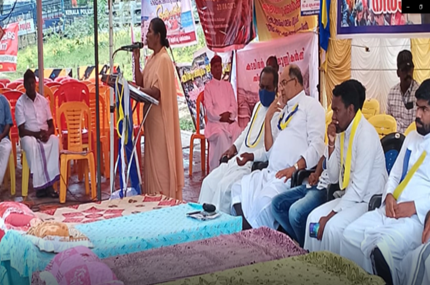The diocese of Trivandrum consists mainly of fisher folk communities. These daily bread winners were in agony as the government signed a pact with Indian billionaire, industrialist Mr. Adani, for the construction of a sea port on the Arabian Sea coast at city location, Vizhinjam, Thiruvananthapuram, in Kerala. The Vizhinjam port is likely to play a pivotal role in the maritime development of the country, particularly Kerala. Realizing the negative impact of constructing the port which will affect the daily life of these people and the environmental issues, the bishops, priests and religious persons came forward to support the flock as the true shepherds.
The impact of Vizhinjam port on the coastal area
 Since Adani’s port expansion construction began, the coastal residents have faced major problems. On the northern side of the project, more and more houses are destroyed by the sea each year. Several scientists say that Adani’s breakwater construction and sea dredging are causing this erosion of the coast. Several families are living as refugees in the fishing villages. The habitats of mussels, sea turtles and lobsters that inhabited coastal rock formations have been destroyed, severely impacting the livelihood of fisher workers in the area.
Since Adani’s port expansion construction began, the coastal residents have faced major problems. On the northern side of the project, more and more houses are destroyed by the sea each year. Several scientists say that Adani’s breakwater construction and sea dredging are causing this erosion of the coast. Several families are living as refugees in the fishing villages. The habitats of mussels, sea turtles and lobsters that inhabited coastal rock formations have been destroyed, severely impacting the livelihood of fisher workers in the area.
In Kottapuram village, which is adjacent to the project, 243 houses have been destroyed. Kerala’s famous tourist center – Kovalam Beach – has been swept away. Thousands of jobs have been lost in the tourism industry as a result. At another celebrated beach, Shankhummugam, sand has disappeared almost up to the beachside road. Seven rows of coastal houses have collapsed.
Only Rs.13,000 has been allocated for compensatory housing for those made homeless by the government. According to the country’s Coastal Management Act, ports should not be built on highly erodible coasts. Deep-sea dredging at Vizhinjam has been a significant contributor to the loss of beaches in the district. In a report, an expert committee appointed by the central government concluded that Vizhinjam is a sensitive area that is heavily prone to erosion, and if ports were built there, the coasts in the surrounding areas would gradually erode.As a result of these impacts on both the marine and coastal environments, the fish workers began their long protest.
A massive movement on the sea coast
 A Massive Movement began on 5 June (World Environment Day) 2022 when Adani’s Vizhinjam port was blockaded. The protest was coordinated by several NGOs and pious associations and movements. It was here the Latin Diocese in Trivandrum organized another protest on 20 July 2022, issuing some demands.
A Massive Movement began on 5 June (World Environment Day) 2022 when Adani’s Vizhinjam port was blockaded. The protest was coordinated by several NGOs and pious associations and movements. It was here the Latin Diocese in Trivandrum organized another protest on 20 July 2022, issuing some demands.
The Franciscan Missionaries of Mary in Trivandrum diocese joined in the struggle which lasted for 140 days at Vizhinjam port site. It was not an easy task. We encouraged the people to participate in the protest. Sisters spoke on the issue at the public meeting, rallies and joined the hunger strike together with the people of the diocese, forane and parish. On the province level one day was set apart for prayer and adoration imploring God to intervene.
An indefinite hunger strike also began in front of Thiruvananthapuram airport, owned and operated by Adani. The protesters had three main demands: (a) stopping the destructive Adani port immediately (b) compensating those who had lost their homes (c) restoring the fish workers’ work places and beaches.
Fighting for Rights in Deep Waters
The world witnessed one of the worst episodes of human rights violation when an attack was unleashed on hundreds of fisher folk of Vizhinjam and it happened barely two weeks before Human Rights Day on December10 last.
No words are enough to condemn the harshness of the government and some political parties, branding the children of the sea as terrorists and anti-nationalists. Those who were praised as the saviours and angels for their rescue operations in the flood-hit regions of the state have to hear the allegations as anti-nationalists and their movement for survival as treason and sedition.
The government degraded itself by registering cases against the Archbishop of Trivandrum and others who were not even present at the site where violence erupted. Violence was unleashed on people who went to the police station seeking release of those arrested for no reason. As the tension was mounting up everywhere we could not function as normal and at last when the protest was called off, we felt relieved.
For us – the FMM – the above event was a memorable one where we were in solidarity with the poor fisher folk and the diocese as we were actively involved in conscientizing, empowering and organizing people as well as being part of this movement ourselves.
Sr. Alice Varghese, fmm


